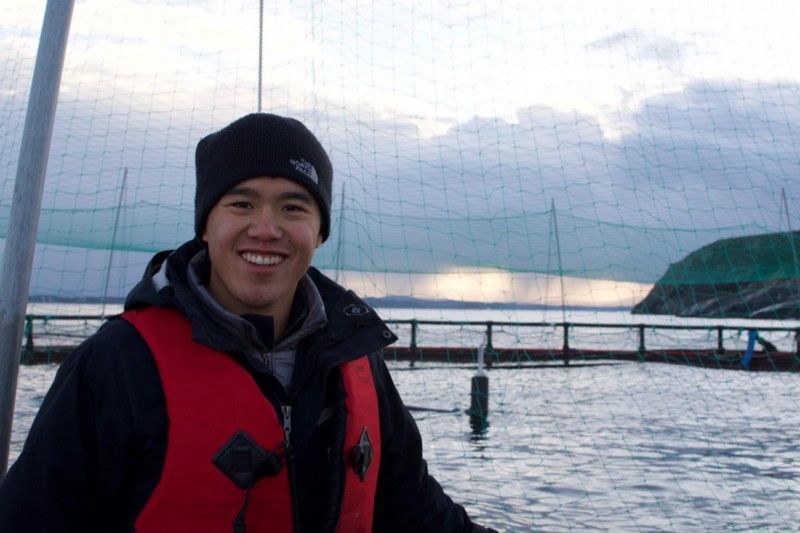Saving Salmon: How Data Analytics is Helping Fish Farmers
Originally published at futureofag.com on April 1, 2019. Part eight of an “Accelerating AgTech” series that profiles exciting ag startups and the accelerators that help them to be successful. Parts 1, 2, 3, 4, 5, 6, & 7

How do two computer science majors end up starting a company in the aquaculture industry?
For Tony Chen, Co-Founder of Manolin, it all started with learning about oyster farming in the Chesapeake Bay. This piqued his interest enough to research further, eventually learning that aquaculture farmers lose as much as 30% of their yield due to fish health-related issues.
Innovation often happens where interests intersect. For Tony and Co-Founder John Costantino, those interests were data, health, and aquaculture. The two teamed up to launch Manolin, a data analytics company focused on serving fish farmers. They eventually honed in on one specific problem to attack: sea lice in salmon farming.
Sea lice are a big deal, accounting for 17 percent of all production costs; an impact that has grown 233 percent since 2010. According to Tony, there was an existing reporting system, but actionable information wasn’t making its way to the farmer in time.
Farmers have treatment options, such as chemicals, feed additives, lumpfish (that eat lice), and skirts (to block sea flow). However, they needed more timely information to deploy the proper measures when necessary.
“These farmers are very familiar with technology” says Chen. “They’ve had sensors, they’ve had cameras, they’ve had dashboards and data entry software for the last 20 years, particularly in Norway. But even with all of this, there are still a lot of inefficient operations. What we’ve noticed is that because these farms are in remote areas, labor is hard to come by. Having people do a lot of paperwork, is not something these farms are really interested in. They’re not huge teams, and they really want to spend most of their time focused on their crop — the fish.”
Listen to the full interview here and subscribe to the “Future of Agriculture” Podcast on any podcast player.
Our oceans are among the greatest resources we have. Over time we have gone through phases of degrading our oceans, which now face challenges of over-fishing and pollution. We often talk about regenerating our soils. Similarly we have the chance to regenerate our oceans. “I believe aquaculture has a really big role to play in that,” says Chen. “There isn’t another industry out there in which so much of this is connected and has such a big impact.”
A big impact, indeed: nearly half of all seafood consumed today comes from farmed fish.
“There’s so much data out there. If we knew more about our oceans, there is a lot we can do to help our food systems and to help save our climate and environment.” — Tony Chen
From learning the industry by helping Chesapeake Bay oyster farmers build websites, Manolin expanded into shrimp and other shellfish farming, before really hitting their stride with salmon.
To give you an idea, salmon are generally ocean-farmed in nets large enough to fit a Boeing 747. Manolin’s ultimate goal is to help farmers optimize yields by better understanding what’s happening in the water through data analytics. Essentially, they’re trying to take what’s in a farmers’ “gut”, and translate that into data so groups and teams can discuss and react. This helps farmers make decisions faster, and anticipate problems that might be coming their way.
Manolin has benefitted greatly from being a part of the Hatch Accelerator, which is the first accelerator dedicated exclusively to the aquaculture industry. Hatch gathers startups from all over the world into various aquaculture hubs to accelerate their businesses. Tony’s cohort was based in Bergen, Norway, which took them to the epicenter of the fish farming industry.
In Norway it is legal to camp anywhere as long as you are not within 100 meters of a dwelling. For customer discover, Tony and John traveled the country, camping out to better understand fish farmers and get feedback on their ideas. Tony recalls hours of sitting in a tent writing code.
Hatch gave Manolin access to a much larger market then they had in the U.S. and enabled them to work full time on the business.
“It’s really trying to be in the right environment so you can learn a lot,” says Tony. “Both from the people in the accelerator as well as from the ecosystem they’re going to drop you into….When you’re dropped into a different country and a different culture, things operate a little bit differently, and as a startup you need to find how to leverage that, and finding the value as a company you can gain as a company from this.”
Improved aquaculture not only benefits fish producers and consumers, but our oceans and our planet. Hatch, and their support of startups like Manolin hope to play an important role in the future of aquaculture.
Learn more about the Hatch here and subscribe to the “Future of Agriculture” Podcast on any podcast player.